Japan Ethological Society
Journal of Ethology
Journal of Ethology is covered in Current Contents and SCI.
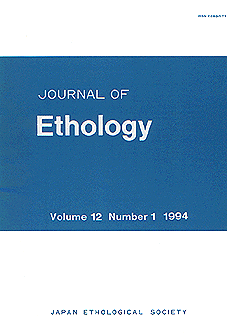
Vol 1 - Vol. 17 |
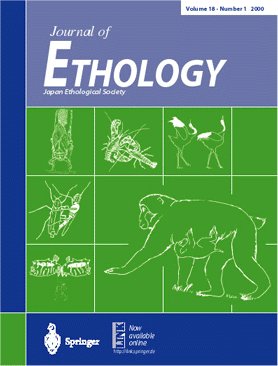
Vol 18 - Vol. 21 |
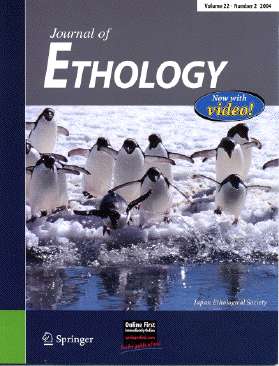
|
Editor's Choice Award
The Editor's Choice Award and the Editor's Choice are open to all articles published in the Journal of Ethology. Selected members of the editorial committee decide on the Editor's Choice (6-10 articles) in the volume for the year, and the first place among them receives the special award. All winning articles are given open access through the courtesy of the Japan Ethological Society. Unrestricted online access allows high exposure and visibility for the articles.
I hope you will consider submitting your next paper to the Journal of Ethology. I look forward to receiving your valuable work.
Kensuke Nakata
Editor-in-Chief
Join the Japan Ethological Society!
Learn about the membership benefits here.
Editor's Choice Award 2022 Article - Enjoy Free Reading!
- The origination events of gametic sexual reproduction and anisogamy By Yukio Yasui & Eisuke Hasegawa (Volume 40, Issue 3, pp 273-284)
https://doi.org/10.1007/s10164-021-00718-x
Editor's Choice 2022 Articles - Enjoy Free Reading!
- Cooperative den maintenance between male Japanese badgers that are delayed dispersers and their mothers By Hiroshi Tanaka, Yukihiro Fukuda, Etsuko Yuki, Yukihiro Ota, Eiji Hosoi & Wataru Kojima (Volume 40, Issue 1, pp 3-11)
https://link.springer.com/article/10.1007/s10164-021-00718-x - Reddish male swallows have short sperm By Masaru Hasegawa, Emi Arai & Masahiko Nakamura (Volume 40, Issue 1, pp 85-89)
https://doi.org/10.1007/s10164-021-00726-x - Lack of discrimination of sex and maturity of conspecifics in the copulation attempts of the male stalk-eyed fly, Sphyracephala detrahens (Diptera: Diopsidae) By Ayumi Kudo, Takeshi Fujii & Yukio Ishikawa (Volume 40, Issue 2, pp 123-131)
https://doi.org/10.1007/s10164-021-00735-w - Encounter with heavier females changes courtship and fighting efforts of male field crickets Gryllus bimaculatus (Orthoptera: Gryllidae). By Takashi Kuriwada (Volume 40, Issue 2, pp 145-151)
https://doi.org/10.1007/s10164-021-00742-x - Locomotion and flow speed preferences in natural habitats by large water striders, Ptilomera tigrina, with micro-morphological adaptations for rowing By Woojoo Kim, Thai Hong Pham, Phuong Dung Nguyen, Anh Duc Tran, Jungmoon Ha, Piotr G. Jablonski & Sang-im Lee (Volume 40, Issue 3, pp 211-221)
https://link.springer.com/article/10.1007/s10164-022-00749-y
Editor's Choice Award 2021 Article - Enjoy Free Reading!
- Defensive spray by a semiaquatic osmylid larva (Insecta: Neuroptera) for both aquatic and terrestrial predators. By Tsukuru Iwanami, Pei Yu & Fumio Hayashi (Volume 39, Issue 3, pp 369–377)
https://link.springer.com/article/10.1007/s10164-021-00714-1
Editor's Choice 2021 Articles - Enjoy Free Reading!
- Trade-off between mate choice speed and decision accuracy under mating competition in female sand gobies. By Beatriz Diaz Pauli & Kai Lindström (Volume 39, Issue 1, pp 55–64)
https://link.springer.com/article/10.1007/s10164-020-00673-z - Wing-waving behaviors are used for conspecific display in the Japanese scorpionfly, Panorpa japonica. By Ryo Ishihara & Takahisa Miyatake (Volume 39, Issue 3, pp 267–274)
https://link.springer.com/article/10.1007/s10164-021-00709-y - Another usage of autotomized penis. By Ayami Sekizawa, Yurika Tsurumi, Natsuki Ito & Yasuhiro Nakashima (Volume 39, Issue 3, pp 319–328)
https://link.springer.com/article/10.1007/s10164-021-00706-1 - An empirical test of bet-hedging polyandry hypothesis in the field cricket Gryllus bimaculatus. By Yukio Yasui & Yuto Yamamoto (Volume 39, Issue 3, pp 329–342)
https://link.springer.com/article/10.1007/s10164-021-00707-0 - Effects of habitat conditions on the boldness and sociability of wild-caught fish (Zacco platypus) along a river. By Zhonghua Tang & Shi-Jian Fu (Volume 39, Issue 3, pp 379–391)
https://link.springer.com/article/10.1007/s10164-021-00715-0 - Whale shark (Rhincodon typus) predatory flexible feeding behaviors on schooling fish. By Austin N. Montero- Quintana, Carlos F. Ocampo-Valdez, J. Abraham Vázquez-Haikin, Oscar Sosa-Nishizaki & Marcela Osorio- Beristain (Volume 39, Issue 3, pp 399-411)
https://link.springer.com/article/10.1007/s10164-021-00717-y
Editor's Choice Award 2020 Article - Enjoy Free Reading!
- An elaborate behavioural sequence reinforces the decoy effect of ink during predatory attacks on squid. By Yuto Hikidi, Noritaka Hirohashi, Takashi Kasugai & Noriyosi Sato (Volume 38, Issue 2, pp 155-160)
https://link.springer.com/article/10.1007/s10164-020-00640-8
Editor's Choice 2020 Articles - Enjoy Free Reading!
- Route reassessment by transporter ants improves speed and directional accuracy of cooperative transport in Formica japonica. By Shumpei Hisamoto, Natsumi Hosaka, Yuka Matsunami & Hideo Iwasaki (Volume 38, Issue 1, pp 107-116)
https://link.springer.com/article/10.1007/s10164-019-00626-1 - Herding mechanisms to maintain the cohesion of a harem group: two interaction phases during herding. By Monamie Ringhofer, Clark Kendrick Go, Sota Inoue, Renata S. Mendonça, Satoshi Hirata, Takatomi Kubo, Kazushi Ikeda & Shinya Yamamoto (Volume 38, Issue 1, pp 71-77)
https://link.springer.com/article/10.1007/s10164-019-00622-5 - Fiddler crabs and their above-ground sedimentary structures: a review. By Juan C. F. Pardo, Gabriel Stefanelli- Silva, John H. Christy & Tânia M. Costa (Volume 38, Issue 2, pp 137-154)
https://link.springer.com/article/10.1007/s10164-020-00647-1 - Experimental tail shortening affects feeding rate depending on original tail length in female barn swallows Hirundo rustica gutturalis. By Masaru Hasegawa, Emi Arai & Masahiko Nakamura (Volume 38, Issue 2, pp 179- 184)
https://link.springer.com/article/10.1007/s10164-019-00637-y - Widespread army ant aversion among East African jumping spiders (Salticidae). By Ximena J. Nelson, Samuel Aguilar-Arguello & Robert R. Jackson (Volume 38, Issue 2, pp 185-194)
https://link.springer.com/article/10.1007/s10164-020-00639-1 - Qualitative description of the submission and agonistic behavior of the Spix’s Macaw (Cyanopsitta spixii, Spix 1824), with special reference to the displacement displays. By Vladislav Marcuk, Cromwell Purchase, Donovan de Boer, Marcellus Bürkle & Katrin Scholtyssek (Volume 38, Issue 2, pp 253-270)
https://link.springer.com/article/10.1007/s10164-020-00650-6
Editor's Choice Award 2019 Article - Enjoy Free Reading!
- Unique numerical competence of Asian elephants on the relative numerosity judgment task. By Naoko Irie, Mariko Hiraiwa-Hasegawa, Nobuyuki Kutsukake (Volume 37, Issue 1, pp 111-115)
https://link.springer.com/article/10.1007/s10164-018-0563-y
Editor's Choice 2019 Articles - Enjoy Free Reading!
- A nudibranch removes rival sperm with a disposable spiny penis. By Ayami Sekizawa, Shin G. Goto, Yasuhiro Nakashima (Volume 37, Issue 1, pp 21-29)
https://link.springer.com/article/10.1007/s10164-018-0562-z - Kin selection and reproductive value in social mammals. By Masaru Hasegawa, Nobuyuki Kutsukake (Volume 37, Issue 2, pp 139-150)
https://link.springer.com/article/10.1007/s10164-019-00586-6 - Alarm call modification by prairie dogs in the presence of juveniles. By Grete E. Wilson-Henjum, Jacob R. Job, Megan F. McKenna, Graeme Shannon, George Wittemyer (Volume 37, Issue 2, pp 167-174)
https://link.springer.com/article/10.1007/s10164-018-0582-8 - Context-dependent aggression toward non-nestmates in the ant Diacamma sp. from Japan. By Jumpei Uematsu, Masayuki Hayashi, Hiroyuki Shimoji, Michel-Olivier Laurent Salazar, Kazuki Tsuji (Volume 37, Issue 3, pp 259-264)
https://link.springer.com/article/10.1007/s10164-019-00611-8 - Nurture is above nature: nursery experience determines habitat preference of red sea bream Pagrus major juveniles. By Kohji Takahashi, Reiji Masuda (Volume 37, Issue 3, pp 317-323)
https://link.springer.com/article/10.1007/s10164-019-00605-6
Editor's Choice Award 2018 Article - Enjoy Free Reading!
- Olfactory discrimination of anal sac secretions in the domestic cat and the chemical profiles of the volatile compounds by Tamako Miyazaki, Takashi Nishimura, Tetsuro Yamashita, and Masao Miyazaki (Vol. 36, Issue 1, pp 99-105)
https://link.springer.com/article/10.1007/s10164-017-0532-x
Editor's Choice 2018 Articles - Enjoy Free Reading!
- Pre-ovipositional maternal care alleviates food stress of offspring in the flower beetle Dicronocephalus wallichii. By Wataru Kojima, Chung-Ping Lin (Vol. 36, Issue 2, pp 135-141)
https://link.springer.com/article/10.1007/s10164-018-0544-1 - Responses to relaxed and reverse selection in strains artificially selected for duration of death-feigning behavior in the red flour beetle, Tribolium castaneum. By Kentarou Matsumura, Takahisa Miyatake (Vol. 36, Issue 2, pp 161-168)
https://link.springer.com/article/10.1007/s10164-018-0548-x - Comparison of personality between juveniles and adults in clonal gecko species. By Osamu Sakai (Vol. 36, Issue 3, pp 221-228)
https://link.springer.com/article/10.1007/s10164-018-0551-2 - Effect of social condition on behavioral development during early adult phase in Drosophila prolongata. By Takashi Matsuo (Vol. 36, Issue 1, pp 15-22)
https://link.springer.com/article/10.1007/s10164-017-0524-x - Influence of aging on brain and web characteristics of an orb web spider. By Alain Pasquet, Camille Toscani, Mylène Anotaux (Vol. 36, Issue 1, pp 85-91)
https://link.springer.com/article/10.1007/s10164-017-0530-z - Mating and aggressive behaviour of Brachyrhaphis olomina (Cyprinodontiformes: Poeciliidae). By Carlos A. Garita-Alvarado, Beatriz Naranjo-Elizondo, Gilbert Barrantes (Vol. 36, Issue 1, pp 1-13)
https://link.springer.com/article/10.1007/s10164-017-0523-y - Ethological description of a fixed action pattern in a kissing bug (Triatominae): vision, gustation, proboscis extension and drinking of water and guava. By Oscar Páez-Rondón, Elis Aldana, Joseph Dickens, Fernando Otálora-Luna (Vol. 36, Issue 2, pp 107-116)
https://link.springer.com/article/10.1007/s10164-018-0547-y
Editor's Choice Award 2017 Article - Enjoy Free Reading!
- Male mate choice in a sexually cannibalistic species: male escapes from hungry females in the praying mantid Tenodera angustipennis. By Mika Kadoi, Kotaro Morimoto, Yasuoki Takami (Vol. 35, Issue 2, pp 177-185)
https://link.springer.com/article/10.1007/s10164-017-0506-z1
Editor's Choice 2017 Articles - Enjoy Free Reading!
- Unique arm-flapping behavior of the pharaoh cuttlefish, Sepia pharaonis: putative mimicry of a hermit crab. By Kohei Okamoto, Haruhiko Yasumuro Akira Mori, Yuzuru Ikeda (Vol. 35, Issue 3, pp 307-311)
https://link.springer.com/article/10.1007/s10164-017-0519-7 - Agonistic display or courtship behavior? A review of contests over mating opportunity in butterflies. By Tsuyoshi Takeuchi (Vol. 35, Issue 1, pp 3-12)
https://link.springer.com/article/10.1007/s10164-016-0487-3 - Behavioral assay and chemical characters of female sex pheromones in the hermit crab Pagurus filholi. By Saori Okamura, Takuma Kawaminami, Hiroshi Matsuura, Nobuhiro Fusetani, Seiji Goshima (Vol. 35, Issue 2, pp 169-176)
https://link.springer.com/article/10.1007/s10164-017-0507-y - Setting an evolutionary trap: could the hider strategy be maladaptive for white-tailed deer?. By M. Colter Chitwood, Marcus A. Lashley, Christopher E. Moorman, Christopher S. DePerno (Vol. 35, Issue 3, pp 251-257)
https://link.springer.com/article/10.1007/s10164-017-0514-z - Sometimes noise is beneficial: stream noise informs vocal communication in the little torrent frog Amolops torrentis. By Longhui Zhao, Bicheng Zhu, Jichao Wang, Steven E. Brauth, Yezhong Tang, Jianguo Cui (Vol. 35, Issue 3, pp 259-267)
https://link.springer.com/article/10.1007/s10164-017-0515-y
Editor's Choice Award 2016
On behalf of the editors of the Journal of Ethology, I would like to congratulate the winners of the Editor's Choice Award 2016 (1 article) and the Editor's Choice 2016 (5 articles). On 12 November 2016, the Award winner accepted his award with certificate at a special ceremony at the 35th annual meeting of the Japan Ethological Society in Niigata, Japan.
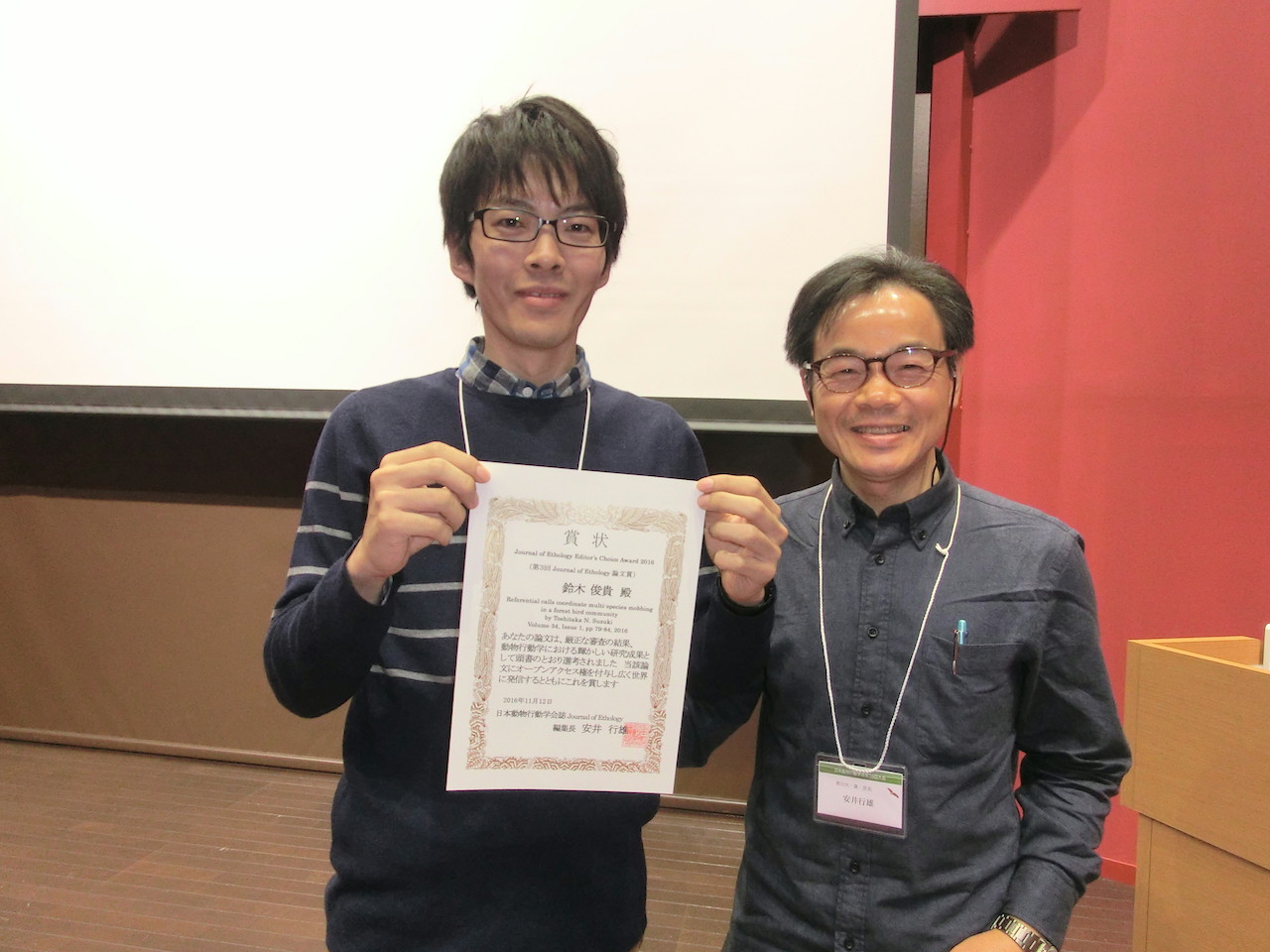
The winner of the Editor's Choice Award 2016, Dr. Toshitaka N. Suzuki (left) with the Editor-in-Chief, Dr. Yukio Yasui (right), at the award ceremony at Niigata University on 12 November 2016.
The Editor's Choice Award and the Editor's Choice are open to all articles published in the Journal of Ethology. Selected members of the editorial committee decide on the Editor's Choice (6-10 articles) in the volume for the year, and the first place among them receives the special award. All winning articles are given open access through the courtesy of the Japan Ethological Society (valued at Euro 2,200 per article). Unrestricted online access allows high exposure and visibility for the articles.
I hope you will consider submitting your next paper to the Journal of Ethology. I look forward to receiving your valuable work.
Yukio Yasui
Editor-in-Chief
Join the Japan Ethological Society!
Learn about the membership benefits here.
Editor's Choice Award 2016 Article - Enjoy Free Reading!
- Referential calls coordinate multi-species mobbing in a forest bird community. By Toshitaka N. Suzuki (Vol. 34, Issue 1, pp 79-84)
http://link.springer.com/article/10.1007/s10164-015-0449-1
Editor's Choice 2016 Articles - Enjoy Free Reading!
- Experiments with claw models explain the function of the waving display of Ilyoplax pusilla (Brachyura: Dotillidae). By Daichi Izumi, Yoko Kawano, Yasuhisa Henmi (Vol. 34, Issue 1, pp 9-14)
http://link.springer.com/article/10.1007/s10164-015-0438-4 - Correlated responses in death-feigning behavior, activity, and brain biogenic amine expression in red flour beetle Tribolium castaneum strains selected for walking distance. By Kentarou Matsumura, Ken Sasaki, Takahisa Miyatake (Vol. 34, Issue 2, pp 97-105)
http://link.springer.com/article/10.1007/s10164-015-0452-6 - Behavioural interactions between the lizard Takydromus tachydromoides and the praying mantis Tenodera aridifolia suggest reciprocal predation between them. By Miyuki Fukudome, Yoshifumi Yamawaki (Vol. 34, Issue 3, pp 231-241)
http://link.springer.com/article/10.1007/s10164-016-0468-6 - Do weaponless males of the hermit crab Pagurus minutus give up contests without escalation? Behavior of intruders that lack their major cheliped in male-male contests. By Chiaki I. Yasuda, Tsunenori Koga (Vol. 34, Issue 3, pp 249-254)
http://link.springer.com/article/10.1007/s10164-016-0470-z - Interference competition between an invasive parakeet and native bird species at feeding sites. By Le Louarn Marine, Couillens Bertrand, Deschamps-Cottin Magali, Clergeau Philippe (Vol. 34, Issue 3, pp 291-298)
http://link.springer.com/article/10.1007/s10164-016-0474-8
Butterflies: Agonistic display or courtship behavior?
A review of contests over mating opportunity in butterflies provides surprising results.
2016.9.5
Journal of Ethology (Chief editor: Yukio Yasui) proudly presents an invited review on butterfly contest behavior by Tsuyoshi Takeuchi. This article is given open access through the courtesy of the Japan Ethological Society.
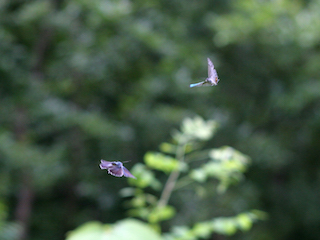 Two males of Chrysozephyrus smaragdinus (Lepidoptera: Lycaenidae) in “air combat” |© Tsuyoshi Takeuchi
Two males of Chrysozephyrus smaragdinus (Lepidoptera: Lycaenidae) in “air combat” |© Tsuyoshi Takeuchi
A study shows that contests of butterflies occur only as erroneous courtships between sexually active males that are unable to distinguish the sex of the other butterflies. These findings by Tsuyoshi Takeuchi from Osaka Prefecture University in Japan were highlighted in a review article in Journal of Ethology, the official journal of the Japan Ethological Society, published by Springer.
Males of various butterfly species compete over mating territory via prolonged aerial interactions. Their contest behavior has previously been explained by the “war of attrition” model in the context of game theory, where two contestants perform costly displays until one of them reaches its limit, or cost threshold, and gives up. However, butterflies lack weapons or any obvious means to attack their opponent and thus it is difficult to explain why they perform aerial displays that impose costs not on their opponent but on themselves.
Takeuchi and his collaborators found in their previous study that there is no evidence that males of territorial butterflies can discriminate the sex of flying conspecifics. Considering the inability to distinguish the sex of their opponents, the male aerial interactions of territorial butterflies should be viewed as prolonged courtship behavior between males chasing each other. They wrongly assume that their opponent is a receptive female and they are not being accepted.
This framework provides a prediction that a contest should occur only between flying males and not between sitting males. Takeuchi reviewed past research on competition over mating opportunity in butterflies. He found that it supported the erroneous courtship theory as expected, revealing that “air combats” take place over mating territory between flying males but contests do not occur when males are sitting around a female or a female pupa.
Assumptions based on human senses can sometimes be misleading in our understanding of animals. Based on observational and experimental results, the author provides controversial but an important framework to understand butterfly behavior. The applicability of this logic to other taxa remains to be investigated.
Reference:
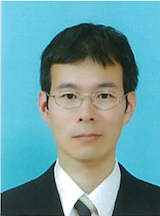
Dr. Tsuyoshi Takeuchi (Osaka Prefecture University)
Editor's Choice Award 2015
On behalf of the editors of the Journal of Ethology, I would like to congratulate the winners of the Editor's Choice Award 2015 (1 article) and the Editor's Choice 2015 (5 articles). On 21 November 2015, the winners (two coauthors) accepted their awards with certificates at a special ceremony at the 34th annual meeting of the Japan Ethological Society in Tokyo, Japan.
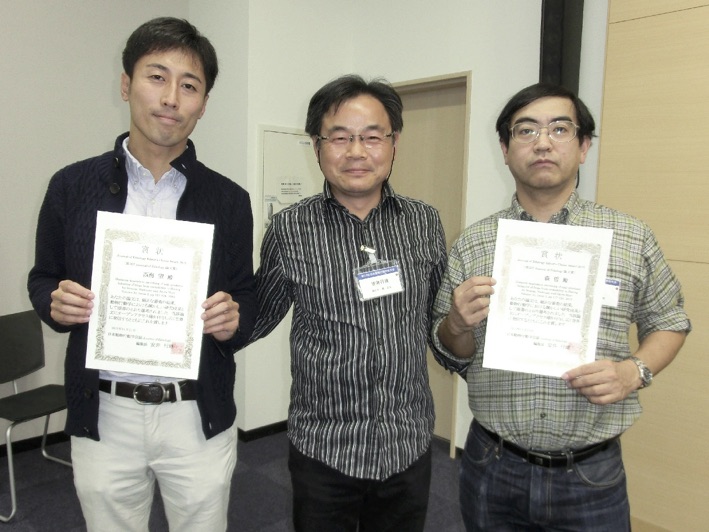
The winners of the Editor's Choice Award 2015, Dr. Nozomi Nishiumi (left) and Dr. Akira Mori (right) with the Editor-in-Chief, Dr. Yukio Yasui (center), at the award ceremony at Tokyo University of Marine Science and Technology on 21 November 2015.
The Editor's Choice Award and the Editor's Choice are open to all articles published in the Journal of Ethology. Selected members of the editorial committee decide on the Editor's Choice (6-10 articles) in the volume for the year, and the first place among them receives the special award. All winning articles are given open access through the courtesy of the Japan Ethological Society (valued at Euro 2,200 per article). Unrestricted online access allows high exposure and visibility for the articles.
I hope you will consider submitting your next paper to the Journal of Ethology. I look forward to receiving your valuable work.
Yukio Yasui
Editor-in-Chief
Join the Japan Ethological Society!
Learn about the membership benefits here.
Editor's Choice Award 2015 Article - Enjoy Free Reading!
- Distance-dependent switching of anti-predator behavior of frogs from immobility to fleeing. By Nozomi Nishiumi, Akira Mori (Vol. 33, Issue 2, pp 117-124)
http://link.springer.com/article/10.1007/s10164-014-0419-z
Editor's Choice 2015 Articles - Enjoy Free Reading!
- Paternal care behaviors of Japanese giant salamander Andrias japonicus in natural populations. By Sumio Okada, Yukihiro Fukuda, Mizuki K. Takahashi (Vol. 33, Issue 1, pp 1-7)
http://link.springer.com/article/10.1007/s10164-014-0413-5 - Guarding males of the hermit crab climb up algae to avoid male–male competition. By Takuma Kawaminami, Seiji Goshima (Vol. 33, Issue 1, pp 25-33)
http://link.springer.com/article/10.1007/s10164-014-0411-7 - Conditional discrimination in Octopus vulgaris. By Koji Tokuda, Reiji Masuda, Yoh Yamashita (Vol. 33, Issue 1, pp 35-40)
http://link.springer.com/article/10.1007/s10164-014-0414-4 - Rapid development of tool use as a strategy to predate invasive land snails. By Márcio A. Efe, Fábio Nunes de Paiva, João Marcelo Holderbaum, Richard J. Ladle (Vol. 33, Issue 1, pp 55-57)
http://link.springer.com/article/10.1007/s10164-014-0412-6 - Object play in thick-toed geckos during a space experiment. By Valerij Barabanov, Victoria Gulimova, Rustam Berdiev, Sergey Saveliev (Vol. 33, Issue 2, pp 109-115)
http://link.springer.com/article/10.1007/s10164-015-0426-8
Editor's Choice Award 2014
On behalf of the editors of the Journal of Ethology, I would like to congratulate the winners of the Editor's Choice Award 2014 (1 article) and the Editor's Choice 2014 (5 articles). On 2 November 2014, the winners (two of the three coauthors) accepted their awards with certificates at a special ceremony at the 33rd annual meeting of the Japan Ethological Society in Nagasaki, Japan.
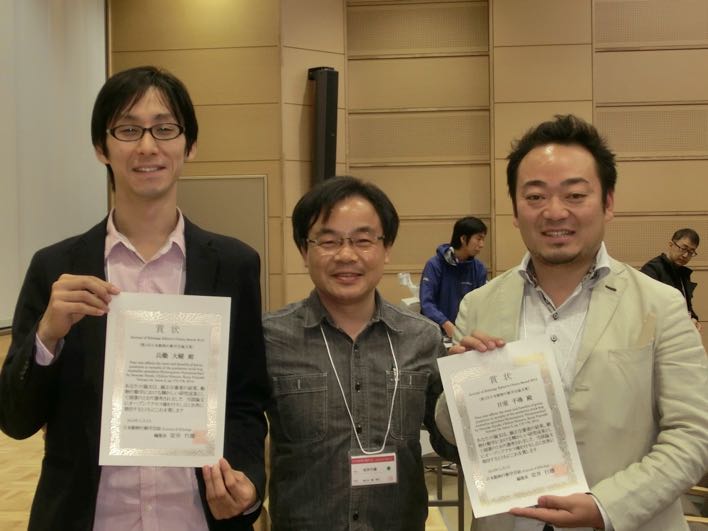
The winners of the Editor's Choice Award 2014, Mr. Daisuke Hyodo (left) and Dr. Chihiro Himuro (right) with the Editor-in-Chief, Dr. Yukio Yasui (center), at the award ceremony at Nagasaki University on 2 November 2014. The 3rd winner, Dr. Kenji Fujisaki, was unable to attend the ceremony.
The Editor's Choice Award and the Editor's Choice are open to all articles published in the Journal of Ethology. Selected members of the editorial committee decide on the Editor's Choice (6-10 articles) in the volume for the year, and the first place among them receives the special award. All winning articles are given open access through the courtesy of the Japan Ethological Society (valued at Euro 2,200 per article). Unrestricted online access allows high exposure and visibility for the articles
I hope you will consider submitting your next paper to the Journal of Ethology. I look forward to receiving your valuable work.
Yukio Yasui
Editor-in-Chief
Join the Japan Ethological Society!
Learn about the membership benefits here.
Editor's Choice Award 2014 Article - Enjoy Free Reading!
- Prey size affects the costs and benefits of group predation in nymphs of the predatory stink bug Andrallus spinidens (Heteroptera: Pentatomidae). By Daisuke Hyodo, Chihiro Himuro, Kenji Fujisaki (Vol. 32, Issue 3, pp 173-178)
http://link.springer.com/article/10.1007/s10164-014-0406-4
Editor's Choice 2014 Articles - Enjoy Free Reading!
- Hidden burrow plugs and their function in the tiger beetle, Cosmodela batesi (Coleoptera, Cicindelidae). By Shou-Wang Lin, Toshinori Okuyama (Vol. 32, Issue 1, pp 23-27)
http://link.springer.com/article/10.1007/s10164-013-0389-6 - Cannibalistic siblicide in praying mantis nymphs (Miomantis caffra). By Murray P. Fea, Margaret C. Stanley, I. Holwell (Vol. 32, Issue 1, pp 43-51)
http://link.springer.com/article/10.1007/s10164-013-0391-z - Sexual dimorphism and courtship behavior in Drosophila prolongata. By Shiori Setoguchi, Hisaki Takamori, Tadashi Aotsuka, Jun Sese, Yukio Ishikawa, Takashi Matsuo (Vol. 32, Issue 2, pp 91-102)
http://link.springer.com/article/10.1007/s10164-014-0399-z - Variation in female guppy preference for male olfactory and visual traits. By Aya Sato, Naoko Ozawa, Kenji Karino (Vol. 32, Issue 3, pp 137-143)
http://link.springer.com/article/10.1007/s10164-014-0402-8 - Juvenile social play and yearling behavior and reproductive success in female Belding's ground squirrels. By Scott Nunes (Vol. 32, Issue 3, pp 145-153)
http://link.springer.com/article/10.1007/s10164-014-0403-7
Chief Editor:
- Takeshi TAKEGAKI (Nagasaki University, Nagasaki)
Associate Editors:
- Jun ABE (Meiji Gakuin University, Yokohama)
- Shigeto DOBATA (Tokyo University, Tokyo)
- Go FUJITA (Tokyo University, Tokyo)
- Kazuya Fukuda (Kitasato University, Sagamihara)
- Maki IKEBUCHI (RIKEN, Wako)
- Takashi IWATA (Kobe University, Kobe)
- Tsunenori KOGA (Wakayama University, Wakayama)
- Yosuke KOJIMA (Toho University, Funabashi)
- Nobuyuki KUTSUKAKE (The Graduate University for Advanced Studies, Hayama)
- Koji MOCHIDA (Nagasaki Institute of Applied Science, Nagasaki)
- Yoshihisa MORI (Teikyo University of Science & Technology, Uenohara)
- Kensuke Nakata (Kyoto Women's University, Kyoto)
- Ryo ODA (Nagoya Institute of Technology, Nagoya)
- Noriyoshi SATO (Tokai University, Shizuoka)
- Michito SHIMOZURU (Hokkaido University, Sapporo)
- Atsushi SOGABE (Hirosaki University, Hirosaki)
- Toshitaka SUZUKI (Tokyo University, Tokyo)
- Kohji TAKAHASHI (Kyoto University, Maizuru)
- Yuma TAKAHASHI (Chiba University, Chiba)
- Fugo TAKASU (Nara Women's University, Nara)
- Keita TANAKA (Rikkyo University, Tokyo)
- Haruki TATSUTA (Kyusyu University, Fukuoka)
- Kenta UCHIDA (Tokyo University, Tokyo)
- Chiaki Ishihara YASUDA (Hokkaido University, Hakodate)
Editorial Board:
- Burney Le Boeuf (University of California, Santa Cruz)
- Anders Brodin (Lund University, Lund)
- Jae C. Choe (Seoul National University, Seoul)
- Martin Daly (McMaster University, Hamilton)
- J. Emmett Duffy (The College of William and Mary, Gloucester Point)
- Mark A Elgar (University of Melbourne, Melbourne)
- John A. Endler (University of Exeter, Exeter)
- Jonathan P. Evans (University of Western Australia, Perth)
- Michael H. Ferkin (University of Memphis, Memphis)
- Raghavendra Gadagkar (Indian Institute of Science, Bangalore)
- Francisco Garcia-Gonzalez (Donana Biological Station-CSIC, Seville)
- Dennis Hasselquist (Lund University, Lund)
- Rowan E. Hooper (New Scientists, London)
- David J Hosken (University of Exeter, Exeter)
- Kenji KARINO (Tokyo Gakugei University, Koganei)
- Sachiko KOYAMA (Indiana University, Bloomington)
- Shin-ichi KUDO (Naruto University of Education, Naruto)
- Akiko MATSUMOTO (University of Ryukyus, Nishihara)
- Kenji MATSUURA (Kyoto University, Kyoto)
- Akira MORI (Kyoto University, Kyoto)
- Csaba Moskat (Hungarian Natural History Museum,Budapest)
- Sean Rands (University of Bristol, Bristol)
- Tsuneo SEKIJIMA (Niigata University, Niigata)
- Leigh W. Simmons (University of Western Australia, Perth)
- Michael T. Siva-Jothy (University of Sheffield, Sheffield)
- Yoshitaka TSUBAKI (Kyoto University, Otsu)
- Kazuki TSUJI (University of Ryukyus, Nishihara)
- Frans B. M. de Waal (Emory University, Atlanta)
- Christer Wiklund (Stockholm University, Stockholm)
- Shinji YABUTA (Teikyo University of Science & Technology, Uenohara)
- Yukio YASUI (Kagawa University, Takamatsu)
See the journal web site at Springer.com for Instructions for Authors.
Manuscripts should be submitted via Editorial Manager.